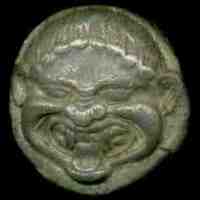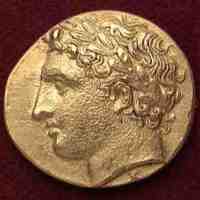
permission to use image granted

image courtesy of Edgar L. Owen, #3803
CLA 320
Syllabus Spring 2018


CLA 320
Syllabus Spring 2018
Dr. Victor A. Leuci
McGuire, Meridith B. Ritual Healing in Suburban America. New Brunswick, NJ:Rutgers University Press. 1988. Print
National Center for Complementary and Integrative Health (NCCIH)'s web site (click here)
American Medical Association's web site (click here)
Philostratus. The Life of Apollonius of Tyana.
selections from Aelius Aristides. The Sacred Tales.
selections from Greco-Roman medical & pharmocological works, e.g. The Hippocratic Corpus, Galen, Rufus, Soranus, Pliny the Elder, and Dioscorides
selections from the Greek Magical Papyri
selected passages from Greek & Latin literature (e.g. the Athenian plague as reported by Thucydides)
Shrines of Asclepius
Reading assignments for the various guest lectures.
Selected readings about Egyptian & Babylonian medicine/religion/magic
This course will examine, from a multi-disciplinary perspective, various approaches to healing--the medical, the miraculous, and the magical--from the Greco-Roman world and from the modern world to see the role they played in individuals and communities lives and the interrelationships between these various approaches to healing. This course will also expect the students to understand and apply, in a critical fashion, pertinent scholarship from various scholarly fields to the ancient (and modern) material. With over 62% of the American population having used complementary and alternative medicine (based on a National Center for Health Statistics survey in 2002) and with the increased popularity of various "non-medical" approaches to healing among various religions (e.g. 43% of Americans using complementary and alternative approaches listed prayer as one approach they used--same 2002 survey), the students will "form intelligent judgements about and rational responses to" a "complex issue," namely, healing, "they will confront as citizens in the 21st century" (New Foundations Document, p. 21)
Different types of writing will be part of the course: critical summaries, research papers, and a final. The critical review and the research paper will be revised on the basis of a conference with me. The critical review or the research paper must be revised on the basis of conferences with a tutor at the Writing Lab. A critique and conference after the completion of a writing assignment may also occur. In general, participants in the class should highly consider using the services of the Writing Lab and especially the Lab tutors, who can be of tremendous assistance.
Note: when turning in the final copy of a paper, the draft with comments by me and/or the writing lab tutor must be turned in at the same time -- it goes without saying that the "suggestions" noted on the draft must be incorporated in the final version of the paper for it to count as revised.
The course will consist of discussion, student presentations and some lectures. The class may occasionally be divided into small groups to treat discussion topics that will most often be based on readings from ancient authors.
Plus/Minus: The grading scale is:
Workload: Since this is a 3 hour class, expect to spend 9 hours a week, on average, preparing for class, attending class, writing papers, and studying for exams. See worksheet in Canvas for a rough guide with times.
Research Paper: 200 points; 3300-6000 words in length. Check on-line assignments page
Outline & Bibliography: for Research Paper: 25 points. Check on-line assignments page
Mid-term and Final: 50 points each; 1200-1800 words in length (the lowest score will be dropped). Check on-line assignments page
Critical Review: 25 points; 600-900 words in length. Check on-line assignments page
Presentation: 50 points; based on the research paper to be presented the last several weeks of the semester.
Class Participation: 50 points; will also include posts in class discussion folder im Canvas.
All students and faculty must adhere to the Honor Code; please see the Student Life Handbook for the full description of the Honor Code--p. 21 in the Student Life Handbook gives a short definition:
"No Westminster student shall commit any act of academic dishonesty in order to advance her or his own academic performance, or to impede or advance the academic progress of others,"
but the sections on plagiarism and cheating are especially important (see Honor Commission Constitution, Article IX).
All faculty and students are required to follow the ADA policy statement, college-wide policies prohibiting harassment and discrimination, the College Duty policy, and the Emergency Procedures. These policies and procedures can be found in the Faculty Handbook, Appendix R (hardcopy and on the Westminster College website), the Faculty Advisor Handbook, and the Student Life Handbook.
Content: The critical review should be a "critical" review, i.e. it should review the key points and present some of the key evidence of the material as well as provide a critique of the material. The mid-term and final are both take-home "exams"—you will be given the topics to choose from about one week before they are due. They should have good examples from our class resources with appropriate in-text citations. The research paper should make appropriate use of primary and secondary evidence to address the topic chosen.
Formatting::
Submission:: A paper copy is due at the beginning of the class period (failure to turn in a paper copy will result in a two letter grade deduction for that paper unless there are extenuating circumstances). An electronic copy of each paper is also required and should be submitted within 24 hours of the due date for the paper copy; note that there is a four letter grade deduction for failure to submit an electronic copy. The research paper will also be turned in to a turnitin drop box in Canvas.
Regular attendance and participation are essential for the success of the whole class. More than two unexcused absences will be considered excessive, and no make-up work will be accepted for unexcused absences. Each unexcused absence past two will result in a deduction of 4 points from the total number of points one has at the end of the semester. If you are ill, e-mail me before class, if possible, or as soon as you are able.
The assignments at the link on the menu bar are not "set-in-stone," and may vary depending on how each class period goes. The syllabus will be updated as needed.